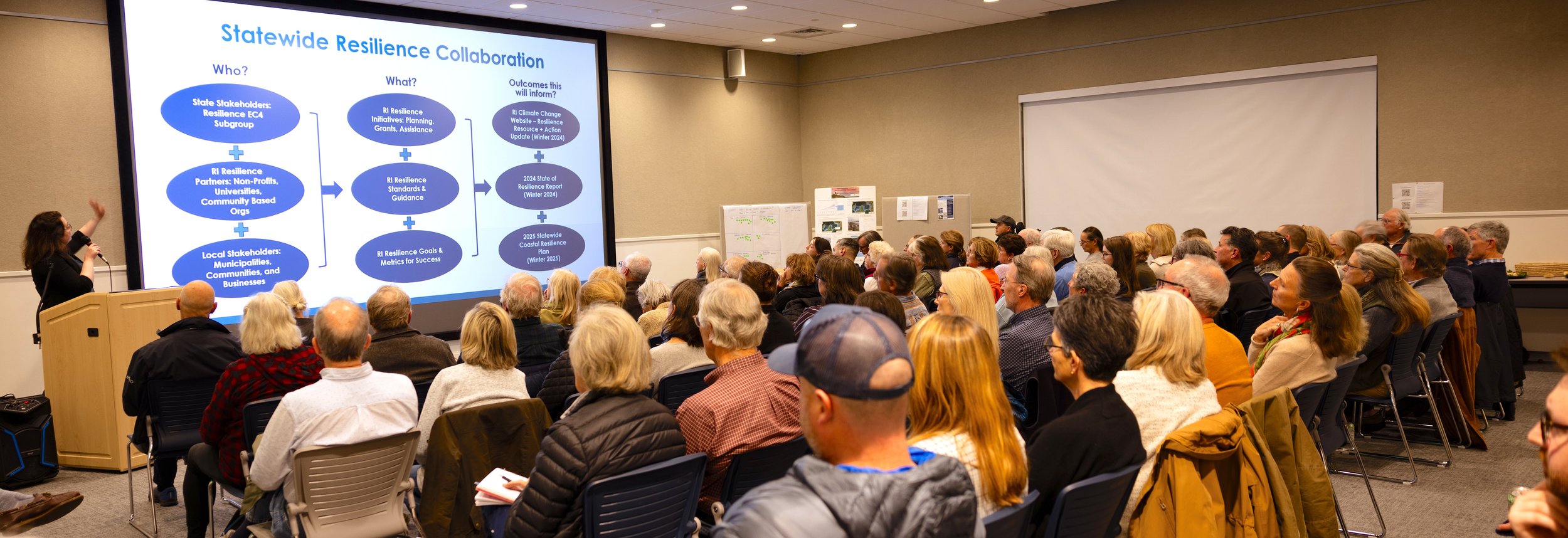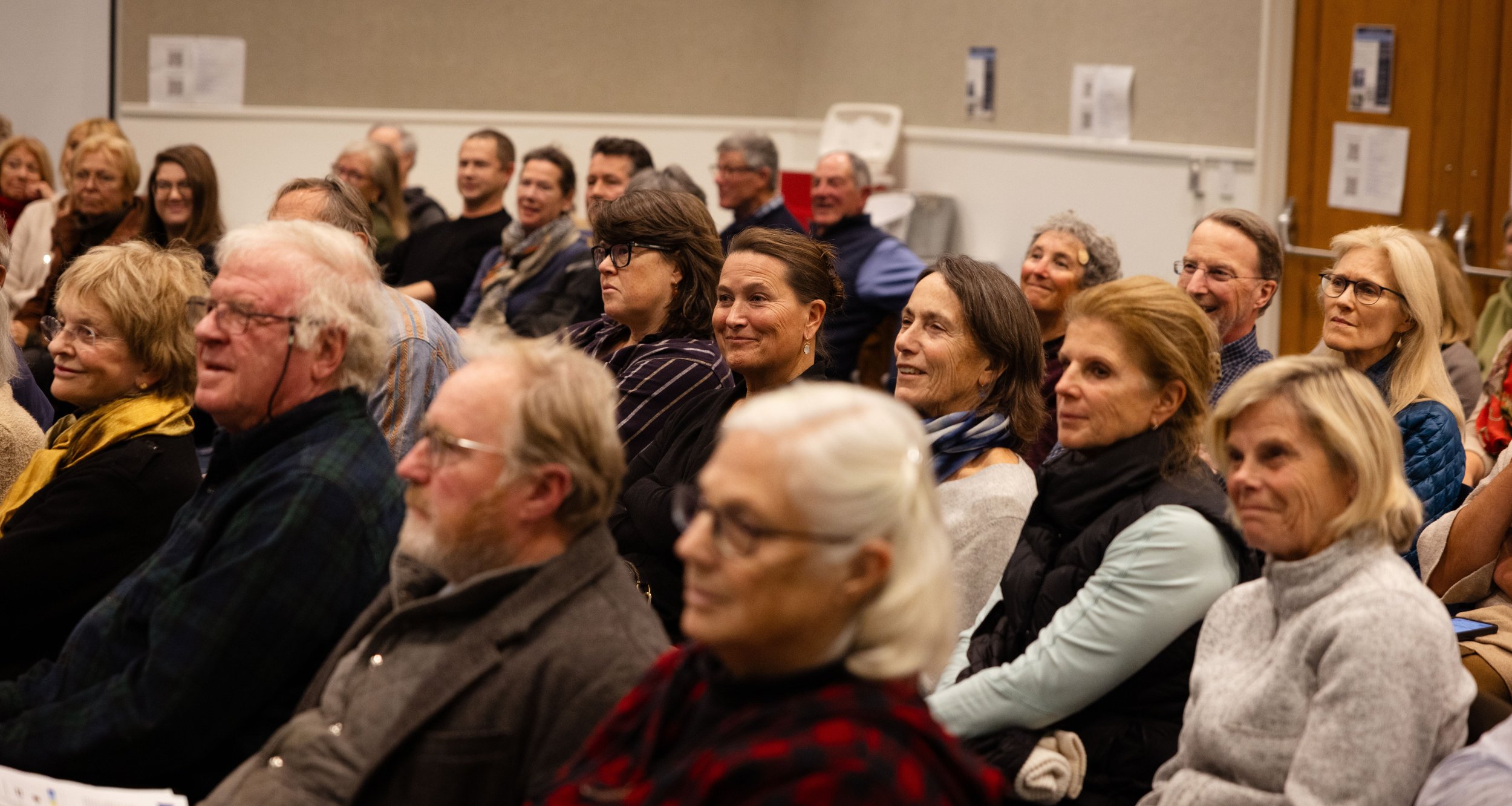Sea Level Rise/Coastal Resilience
Worldwide, no one is now spared the disastrous effects of climate change, and Conanicut Island is no exception. In recent winters, rising sea levels combined with powerful storm surges cut off access to and from Beavertail several times, and many people were stranded in either direction by the closure of the Mackerel Cove road. Similar effects occurred on Conanicus Avenue in town, and the North Road at Great Creek. And the situation will only get worse. Protect Conanicut Coastline is beginning to take action, by studying the possible methods and funding to control the flooding and by engaging citizen action to ensure that Town, State, and Federal agencies are all aligned on the urgency of the matter and are all working in partnership on mediation strategies for the long term.
July 2024 Coastal Conversation.
On July 16, 2024, nearly 50 fellow residents of Jamestown living south of Mackerel Cove got together for an informal discussion to share our concern over the coastal flooding that has blocked access on and off the south end of our island during storms over the last few years. Below is a recap of the remarks from the following presenters:
Stuart Ross, Chair, Protect Conanicut Coastline. Stuart moderated the conversation and introduced the speakers.
Pam Rubinoff, Associate Coastal Manager, Coastal Resilience, RI Sea Grant at URI Coastal Resource Center. Pam talked about sea level rise predictions for the state and suggest we look at StormTools and the MyCoastRI app to see sea level rise predictions in our own neighborhoods and community.
Jeff Boal, Member, Jamestown Conservation Commission. The Commission has recently applied for a $350,000 OSCAR grant, (Ocean State Climate Adaptation Resilience Fund) [Since approved] in partnership with the Jamestown Recreation Department. The Conservation Commission is looking at sea level rise and erosion at Mackerel Cove from a natural perspective and the Recreation part of the proposal looks at it from an engineering perspective. The funding would allow the town to conduct an engineering study and dune restoration plan, which includes growing dune grass and other native vegetation at the Jamestown Community Farm to stabilize the sand and prevent erosion for use at the beach.
Alex Finkelman. Jamestown State Representative. Representative Finkelman is working at the state level to get funding set aside in the state budget for municipal resilience projects. He lives on Beavertail Road and has his own setbacks with being trapped on one side of a road closing or another. He stated that the state owns the road, the town owns the beach, so we’re going to need federal assistance. For example, the state proposed a bridge replacement at North Road, Great Creek, costing $93 million, plus an additional $7 million for a pedestrian/bikeway. While the state has proposed this, it doesn’t have the funding to execute it.
Town Council Members, Erik Brine and Mary Meagher. Mary recognized that our small population might not be high on the state register when other more populated communities like Warren and Newport are facing great issues as well. She stressed the importance of our collective voice and to make ourselves known politically so that our island’s resilience will also be in the purview of the state. We need to reach out to the Governor and our US Senators for funding resources.
Town Council Member Eric Brine talked about the town budget - $29 million a year is the total town budget. And 60% of that goes to schools and education. So it's tiny; we can't even afford the studies, much less fixing the problem so we have to make some really hard decisions. So your voice is important. And the timing is fairly good for that, because we're about to go through a new comprehensive study for the town. We will have to make some generational decisions for our island’s infrastructure.
One key takeaway from what these knowledgeable presenters shared is that this is an issue that will require long range planning and funding at the community, state and federal levels. We were congratulated for banding together to voice our concerns and were encouraged to keep the pressure on the slow wheels of bureaucracy so that we will be part of any Coastal Resilience and Restoration priority list.
The meeting adjourned after recognition from the audience that we will need to continue these Coastal Conversations, and that the next one should include participation from all islanders, not just those residing on Beavertail. A tentative date was set for some time in November 2024.
Mackerel Cove During Wintertime King Tide Photo Credit: Kathleen Delorey Brown
November 2024 Coastal Conversation
On November 12, 2024, PCC’s second Coastal Conversation was attended by more than 90 island residents and several reporters at the Jamestown Library; the topic: the existential crisis of sea level rise and ever-increasing storm surges. Presentations by key officials and coastal resilience experts identified Conanicut Island’s especially threatened low-lying areas; the federal, state and municipal offices and non-profits working to address these challenges; best practices employed by neighboring island communities; and potential funding sources to deal with this massively expensive and debilitating threat to Conanicut Island, its natural resources and our way of life.
The comprehensive group of key local, state and federal officials and coastal resilience experts who presented is impressive.
US Senator and Jamestown resident Jack Reed kicked off the proceedings with an inspiring video message.
RI State Representative Alex Finkelman (Jamestown & Middletown) reported that Beavertail Road / Mackerel Cove Beach has been added to the State list of areas needing urgent attention. Previously, it ranked #108 on same State list that placed North Road / Great Creek at #6.
Eliza Berry, a Research Associate with URI’s Coastal Resources Center, introduced a video from URI Coastal Engineering students Logan Bukowski and Eva Davet on their senior capstone design project to study the specific threats to Beavertail Road between Mackerel Cove and Sheffield Cove. They offer a medium-term remediation concept to bolster the dunes against storm-induced flooding. The students will continue their engineering work through the Spring 2025 semester.
Kim Korioth, RI State Chief Resilience Officer, presented the state-wide program to incorporate climate resilience through the Municipal Resilience Program that provides action grants and state resilience funding for identified projects. She announced the state will soon be hiring three regional state resilience officers, one of whom will be assigned to assist Jamestown.
Paige Myatt, Director of Climate Resilience for Aquidneck Island Land Trust, shared AILT’s success in obtaining a $2 million federal grant to establish a resilience team to remediate specific areas on that island.
Jamestown Town Council member Mary Meagher led a group of key Jamestown officials in a wide-ranging discussion of our island’s specific situation on this critical issue.
Lisa Bryer, Jamestown Town Planner, emphasized the importance of coastal resilience as a key component to Jamestown’s Comprehensive Plan, now entering its ten-year renewal cycle. She said the town plans to hire a part-time Resilience Officer.
Anne Kuhn-Hines, Jamestown Conservation Commission Chair; and Ray DeFalco, Jamestown Parks and Recreation Director; spoke about short-term dune restoration by planting a mix of appropriate plant species as well as the pending decision by the state to approve a key OSCAR (Ocean State Climate Adaptation & Resilience Fund) grant to strengthen Mackerel Cove’s defense against storm inundations. The grant would fund expert engineering analysis and potential solutions. Note: This grant does not include funding to implement these solutions.
US Congressman Gabe Amo (1st District - RI) delivered a powerful closing video message and focused on potential federal funding opportunities for Jamestown.
A robust Q&A session followed the presentations, indicating the deep public concern for Conanicut Island and coastal resilience. This conversation offers PCC a number of opportunities to step up our efforts on this critical issue over the next several months and well beyond. We will keep you closely updated.
Paige Myatt, Director of Climate Resilience for Aquidneck Island Land Trust
Eliza Berry, Research Associate with URI’s Coastal Resources Center
Anne Kuhn-Hines, Jamestown Conservation Commission Chair
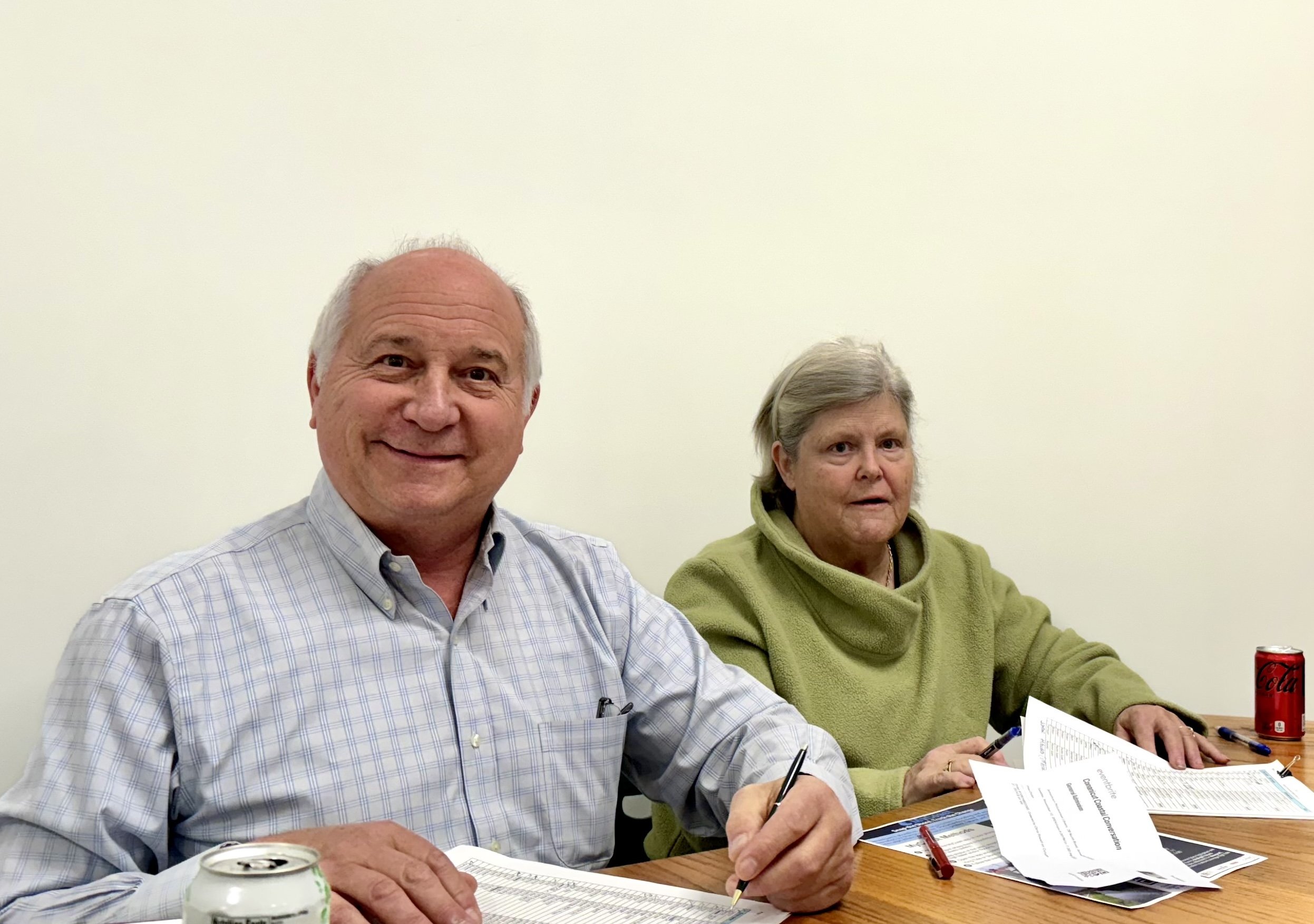
Bill & Ann

Anne Kuhn-Hines & Caroline Niemczyk
Chris Powell

Jane & Peter
Ray DeFalco, Jamestown Parks and Recreation Director

Stuart Ross - PCC Chairman

Alex & Stuart

Kathleen Brown
Alex Finkelman
Ray Falco & Lisa Bryer
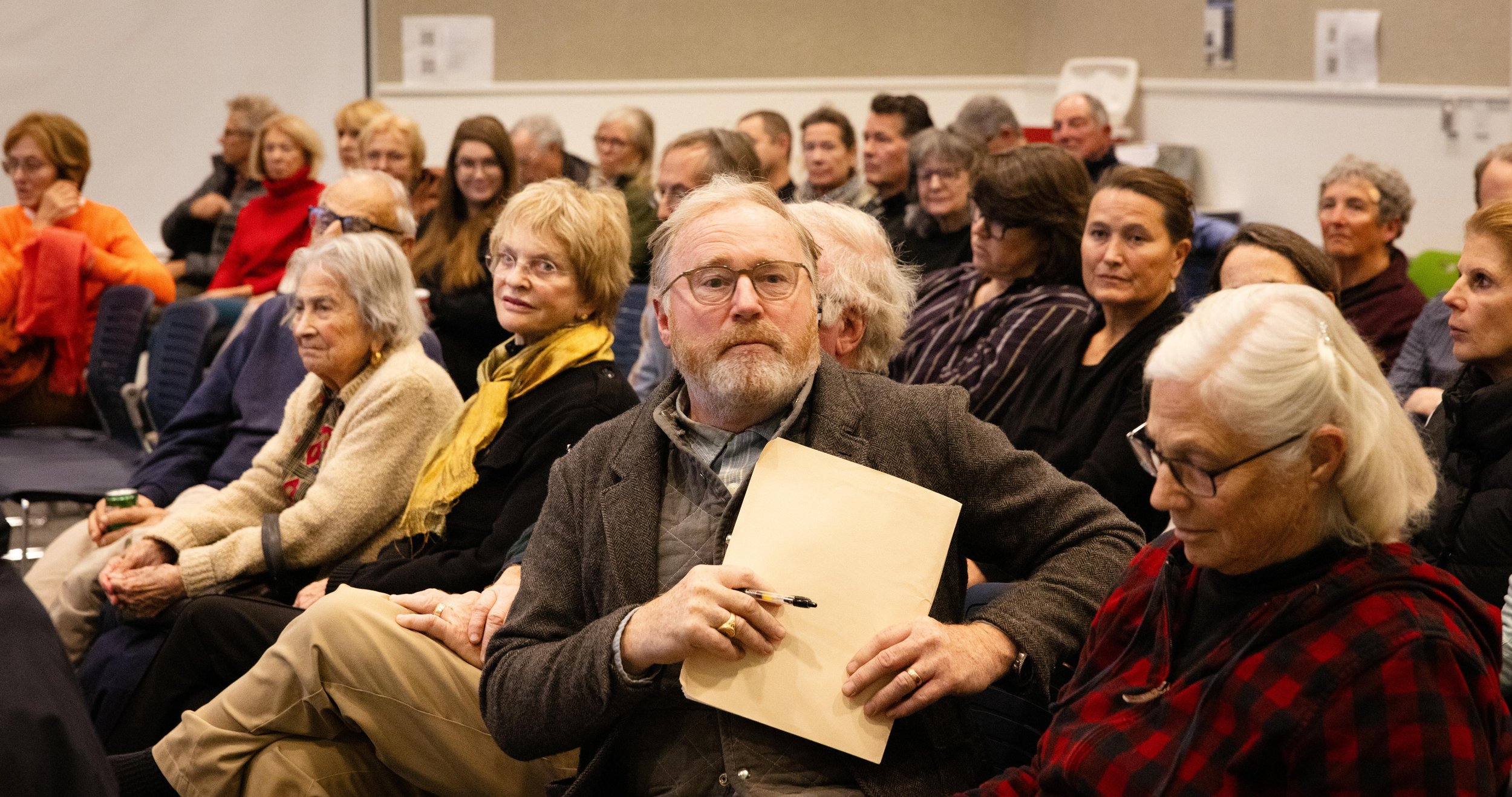
Jeff Boal

Anne Garnett
Gabe Amo

Hutch
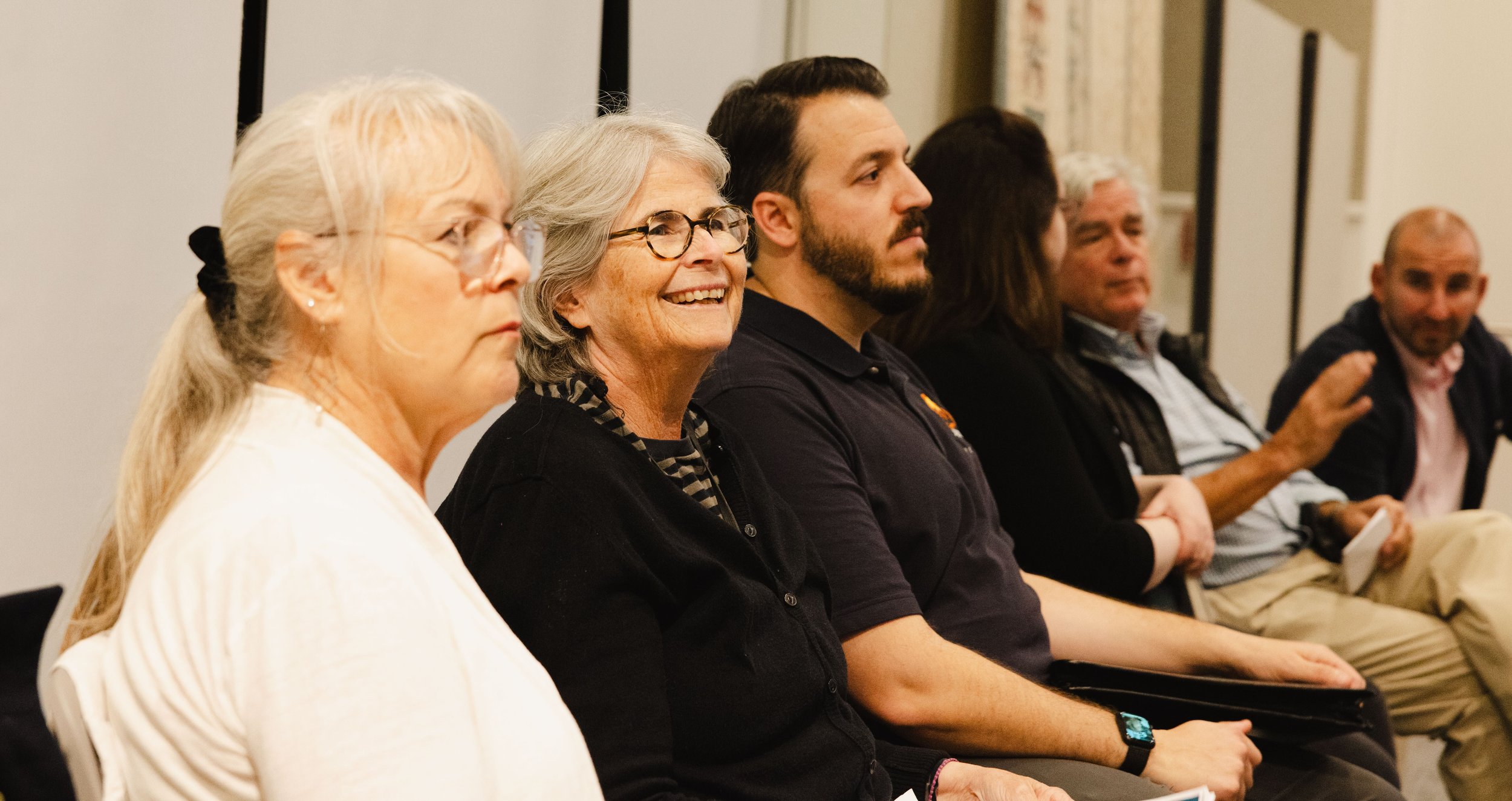
Lisa Bryer & Mary Meagher
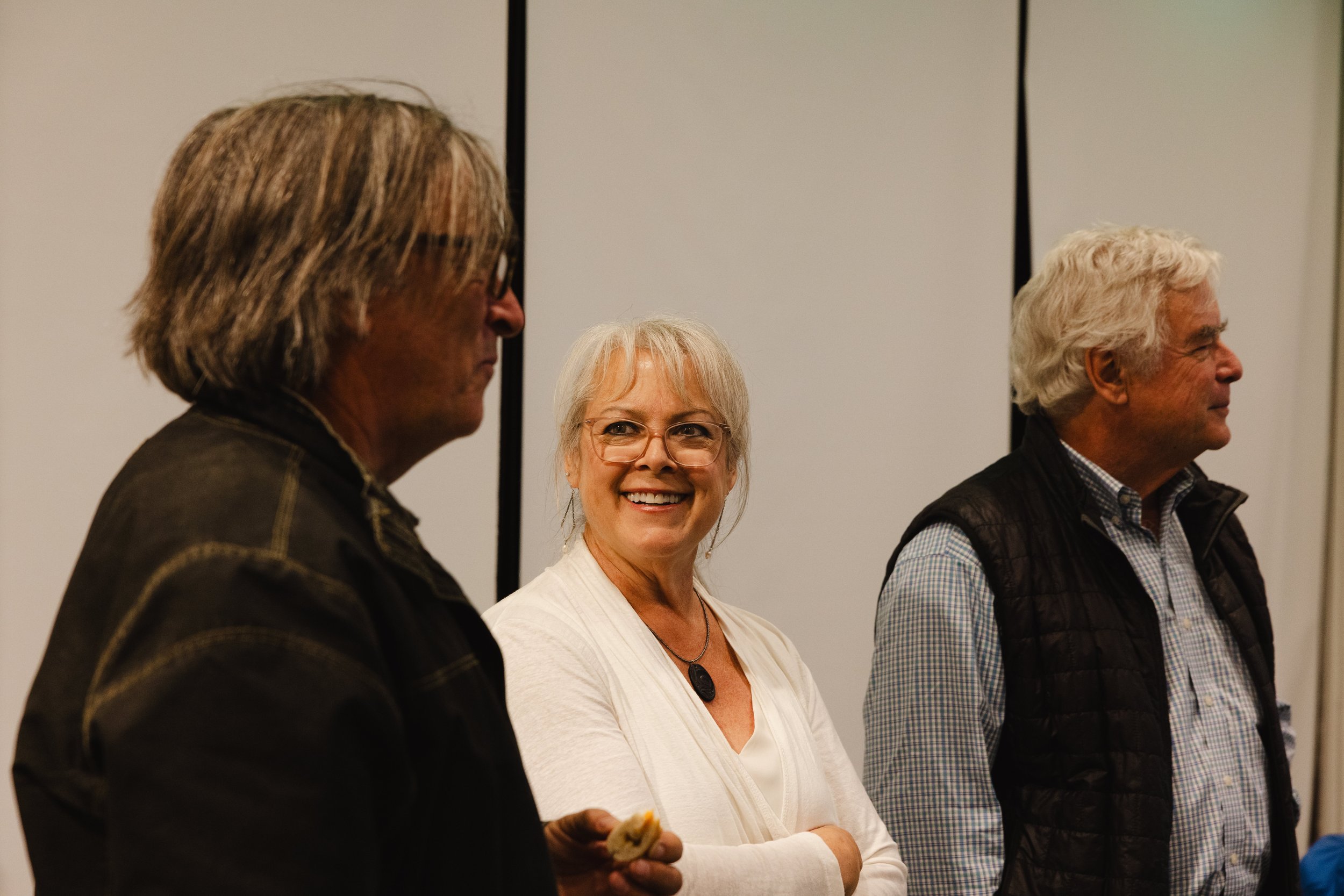
Hutch, Lisa & Stuart

Logan Bukowski & Eva Davet Virtual Presentation
Mary Meagher
